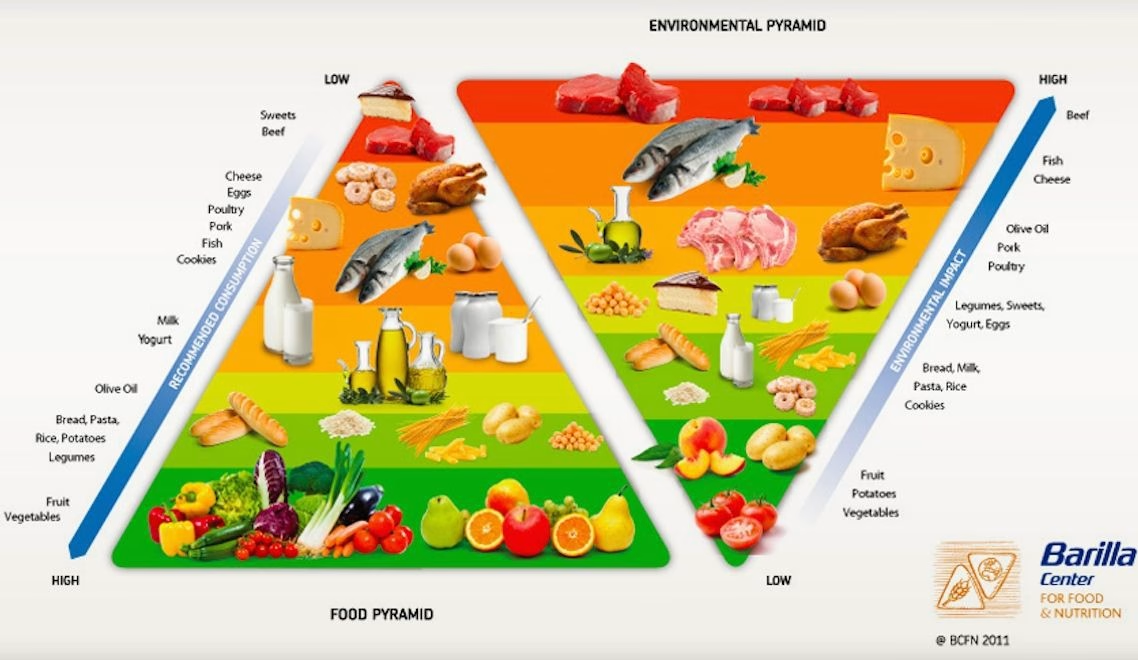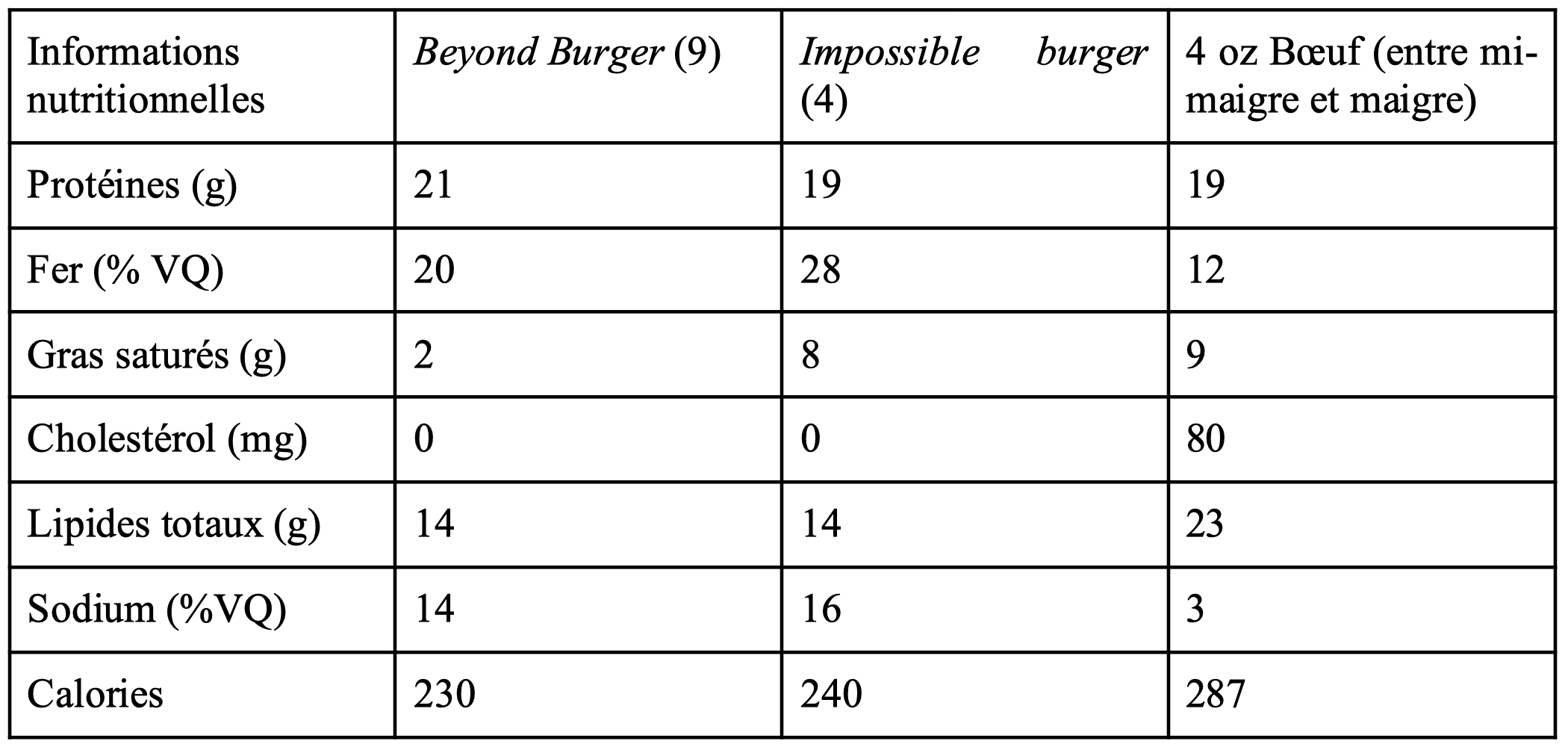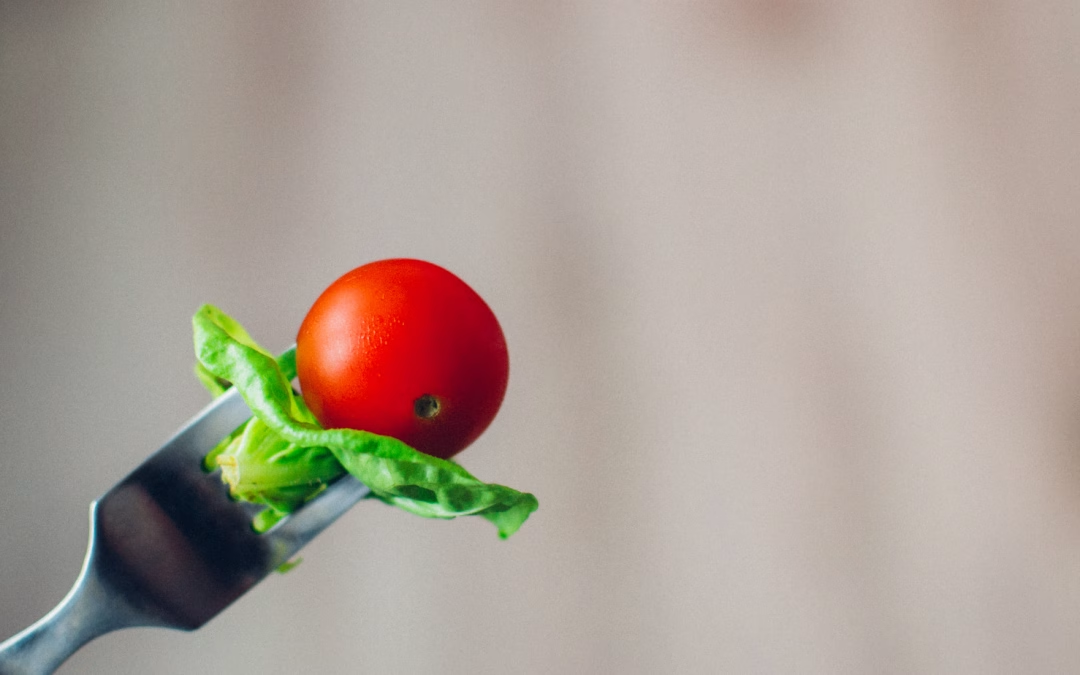Vegetarian food: a double victory for health and the environment
In a world where environmental and public health challenges are increasingly present, food choices take on vital importance. Did you know that the contents of your plate can be a powerful lever for a more sustainable future? The science is clear: opt for a plant-based diet is not just a trend, it's an effective strategy for human and planetary well-being!
The vision of the two inverted pyramids: human and planetary health
Imagine two pyramids that complement each other. The first, the food pyramid, The first, which highlights foods to be consumed in abundance for good health (e.g. fruits, vegetables, whole grains) (3). The second represents the’environmental impact of these same foods (3). Fascinatingly, the foods at the bottom of the food pyramid (those to be favored) are also those with the lowest environmental impact, while those at the top (red meats, certain processed products) have the largest footprint (3). Thus, the Mediterranean diet, with its emphasis on plants, perfectly illustrates this concept (3).

Reference : Treehugger (10)
Vegetate your plate to help the planet
Vegetarian and vegan diets contribute to drastic reductions in greenhouse gas (GHG) emissions, land use and water consumption (5). A vegan diet, for example, can reduce GHGs by 75 % compared with a meat-rich diet (5). Even industrial meat substitutes, such as veggie burgers (described below), show impact reductions of 87 to 96 % compared with beef (5).
Optimal health: the role of plants and plant substitutes
In terms of human health, the benefits are just as compelling. A diet rich in plant foods is associated with a significant reduction in the risk of type 2 diabetes, cardiovascular disease, obesity and certain cancers (2). Naturally rich in fiber, antioxidants and essential micronutrients, plant foods offer valuable health benefits (6).



Is soy, even in its ultra-processed version, to be favoured?
Did you know that even though they are classified as ultra-processed foods, some plant-based substitutes like the ImpossibleTM burger (soy-based) can reduce water usage by 87 %, land use of 96 % and GHG emissions by 89 % compared to conventional ground beef (5)? If the half the beef consumed in the form of burgers in Canada were replaced by a plant-based alternative, the surface area of land use would be considerably reduced - an area larger than the deforested part of the Brazilian Amazon in 2020 (5). Also, the reduction in GHGs would be equivalent to taking 1.5 million cars off the road annually (5)! The benefits are similar for cow's milk when compared to soy beverage (5). Soy beverage production requires considerably less water, and its production generates far fewer GHGs (1).
Over and above these undeniable environmental advantages, the nutritional values of soy and its derivatives make it a perfect alternative to. Studies show that modern meat analogues can offer a nutritional composition broadly similar to that of traditional meat products. Plant-based meat alternatives represent an interesting substitute for meat, provided that preference is given to high-fiber, high-protein, nutrient-dense, low-sugar options. For protein intake, soy-based alternatives are particularly recommended (1).
Soy, a nutritious food
Soy is a high-quality protein, containing all the essential amino acids the body needs to function optimally (1). Research has shown that regular consumption of plant-based meat (based on pea and soy proteins) can significantly reduce LDL cholesterol («bad» cholesterol) and a potential cardiovascular risk factor (1). What's more, regular replacement of meat by plant-based alternatives has been shown to have favorable changes in intestinal microbiota such as increased butyrate metabolism (11).
When choosing soy beverages, we recommend those that are high in protein (6 to 8 g per cup (250 ml)), low in sugar and enriched with calcium and vitamin D.
Nutritional spotlight: Plant-based alternatives to commercial burgers vs. ground beef


Integrating plants into everyday life
You don't have to radically change all your habits! A gradual approach is often the key to success. The Academy of Nutrition and Dietetics (Vegetarian Diets: Planetary Health and Its Alignment with Human Health) states that well-planned vegetarian diets, including vegan, are healthy, nutritionally adequate and may offer benefits in the prevention and treatment of certain diseases. They are suitable for all stages of life and for athletes (7).
For athletes? The good news is that soy protein supplementation has been shown to be as effective as whey protein supplementation for muscle mass synthesis and gains (1).
Here are a few tips:
Reduce red meat and ultra-processed meats
First, set a realistic target for reducing your consumption of red and processed meats. Any reduction is already good for your health and that of the planet. Every little step counts. In an ideal world, this would be lowered to 2-3 times a month and the recommended serving size for ultra-processed meats is around 50 g, and 100 g for red meat (3).
Exploring plant proteins
Take up the challenge of making a legume-based recipe (lentil soup, bean-based chili, chickpea curry), general tao tofu or Asian tempeh bites.
Discover the different types of tofu available: smoked tofu (ex. Sojà or Sunrise), garlic tofu, steak spice tofu (ex. Tofu tofu) or tofu spread (ex. Fontaine Santé) !
Soy-based textured vegetable protein (TVP) is now available seasoned (ex. The brutes).
Moderate use of processed meat substitutes (1, 5)
Although classified as an ultra-processed food, they retain environmental and potentially health benefits in some respects, and above all they can ease the transition. However, it is advisable to choose those that are low in sodium and sugar, and high in fibre and protein. Why not try a veggie burger at your next BBQ?
Key nutrients for a successful plant-based diet
Some vitamins and minerals to watch out for
If you're cutting back on animal products, you may want to pay particular attention to vitamin B12, iron, iodine, vitamin D, calcium and omega-3 (7). These are less present or less bioavailable (reduced absorption) in the plant kingdom (7). Depending on your individual intake and needs, supplementation may be considered, especially for B12 in people adopting a vegan diet (8).
By incorporating more plant-based ingredients into your diet, you're making a concrete contribution to your well-being and to the health of our precious planet. For more inspiration, refer to the menu vegetarian or vegan. What small change will you make this week?
For personalized support and recommendations on the supplements best suited to your needs, you may wish to contact make an appointment with one of the team's nutritionists.
References
1. Bye ZL, Keshavarz P, Lane GL, Vatanparast H. What Role Do Plant-Based Diets Play in Supporting the Optimal Health and Well-being of Canadians? A Scoping Review. Adv Nutr. 2021;12(6):2132-46. https://doi.org/10.1093/advances/nmab061
2. Capodici A, Mocciaro G, Gori D, Landry MJ, Masini A, Sanmarchi F, et al. Cardiovascular health and cancer risk associated with plant based diets: An umbrella review. PloS One. 2024;19(5):e0300711. https://doi.org/10.1371/journal.pone.0300711
3. Ferrari L, Panaite SA, Bertazzo A, Visioli F. Animal- and Plant-Based Protein Sources: A Scoping Review of Human Health Outcomes and Environmental Impact. Nutrients. 2022;14(23):5115. https://doi.org/10.3390/nu14235115
4. Impossible Foods. What are the nutritional facts about L'Impossible Burger? https://faq.impossiblefoods.com/hc/fr-ca/articles/360018939274-Quelles-sont-les-donn%C3%A9es-nutritionnelles-de-L-Impossible-Burger (Accessed June 3, 2025).
5. Kustar A, Patino-Echeverri D. A Review of Environmental Life Cycle Assessments of Diets: Plant-Based Solutions Are Truly Sustainable, even in the Form of Fast Foods. Sustainability. 2021;13(17):9926. https://doi.org/10.3390/su13179926
6. Medawar E, Huhn S, Villringer A, Witte AV. The effects of plant-based diets on the body and the brain: a systematic review. Transl Psychiatry. 2019;9(1):226. https://doi.org/10.1038/s41398-019-0552-0
7. Melina V, Craig W, Levin S. Position of the Academy of Nutrition and Dietetics: Vegetarian Diets. J Acad Nutr Diet. 2016;116(12):1970-80. https://doi.org/10.1016/j.jand.2016.09.025
8. Selinger E, Neuenschwander M, Koller A, Gojda J, Kühn T, Schwingshackl L, et al. Evidence of a vegan diet for health benefits and risks - an umbrella review of meta-analyses of observational and clinical studies. Crit Rev Food Sci Nutr. 2023;63(29):9926-36. https://doi.org/10.1080/10408398.2022.2075311
9. The Beyond Burger. Beyond Meat. https://www.beyondmeat.com/fr-CA/products/the-beyond-burger/ (Accessed June 3, 2025).
10. Treehugger. Do You Eat for Health or Environmental Sustainability? The Double Pyramid Says You Can Do Both. https://www.treehugger.com/do-you-eat-for-health-or-environmental-sustainability-4856427 (Accessed June 3, 2025).
11. Toribio-Mateas MA, Bester A, Klimenko N. Impact of Plant-Based Meat Alternatives on the Gut Microbiota of Consumers: A Real-World Study. Foods (Basel). 2021;10(9):2040. https://doi.org/10.3390/foods10092040
